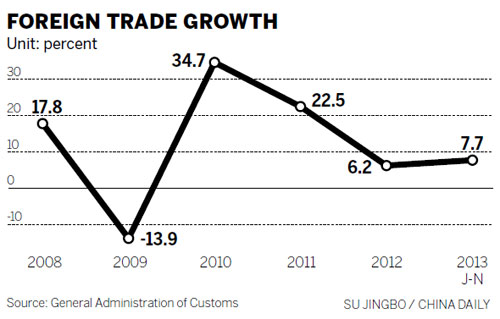


Total foreign trade went up 7.7 percent to $3.77 trillion in the January-November period, according to the General Administration of Customs. Exports increased 8.3 percent to $2 trillion and imports rose 7.1 percent to $1.77 trillion, yielding a trade surplus of $234.15 billion.
The International Monetary Fund projected in October that world trade will grow 4.9 percent in 2014, compared with 2.9 percent this year.
"Overseas demand won't show a big improvement next year. But moves to follow up on the Third Plenum's comprehensive reform plan, such as support for customs procedures, loans and insurance, will give a forceful boost to exports.
"At present, it's crucial for Chinese exporters to retain their overseas market shares, because regaining those positions will be very difficult once lost," said Wei, who's also a guest economist of China Daily.
"Foreign trade in 2014 will be slightly better than this year. The government will stabilize the growth of exports and imports with different measures, while speeding up the transformation and upgrading of the nation's trade.
Analysts cautioned that the overstatement of trade figures in the first half of this year, caused by the inflow of speculative funds disguised as trade payments, was likely to have recurred in November.
"The government warned of potential difficulties when setting this year's trade growth target. The external environment is actually better than predicted," Huo said.
"In 2014, an economic recovery in developed countries, driven mostly by currency devaluation, will mean reduced demand for Chinese products. In international markets, Chinese enterprises are facing increasing competition from emerging economies," Long said.
Wei added that trade friction with the United States and European Union, as well as emerging economies, is choking off some Chinese exports.